Building Professional Capacity: Delegation of Duties in Nursing Report
VerifiedAdded on 2023/06/05
|7
|1536
|433
Report
AI Summary
This report delves into the critical topic of delegation of duties within the nursing profession. It begins by defining delegation and outlining the five rights that govern its practice. The report then justifies the choice of this issue, highlighting its prevalence and importance in nursing, particularly given the unpredictable nature of patient care and the need for nurses to manage various responsibilities. It explores both the advantages and disadvantages of delegation, emphasizing the need for adherence to proper procedures for positive outcomes. The core of the report examines the impact of unresolved delegation issues, such as conflicts and reduced teamwork. It suggests realistic strategies for conflict resolution, focusing on effective communication, timing, and understanding the boundaries of employees. The report concludes by summarizing the key points, re-emphasizing the significance of delegation and the strategies for mitigating potential conflicts to foster a cohesive and efficient nursing environment.
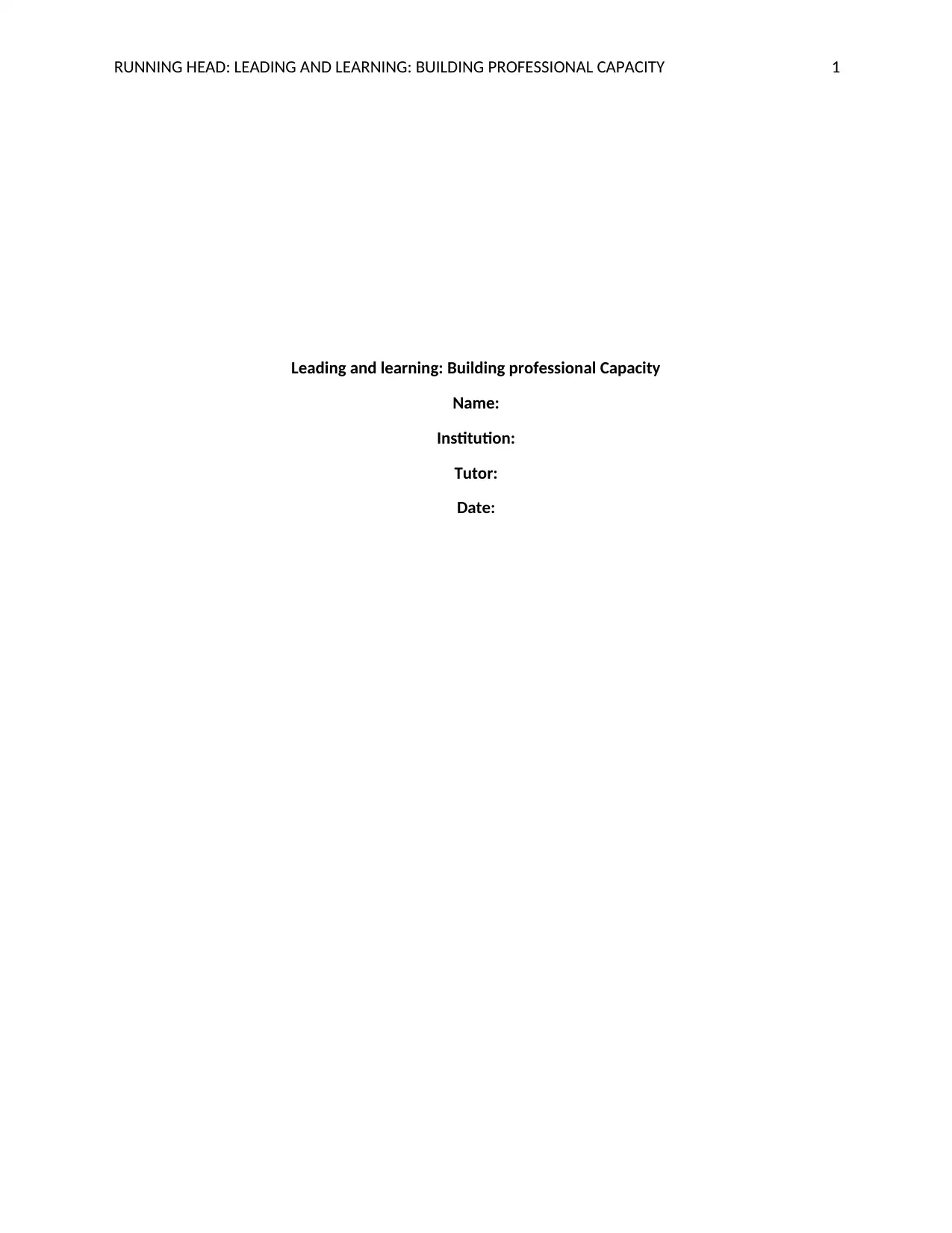
RUNNING HEAD: LEADING AND LEARNING: BUILDING PROFESSIONAL CAPACITY 1
Leading and learning: Building professional Capacity
Name:
Institution:
Tutor:
Date:
Leading and learning: Building professional Capacity
Name:
Institution:
Tutor:
Date:
Paraphrase This Document
Need a fresh take? Get an instant paraphrase of this document with our AI Paraphraser
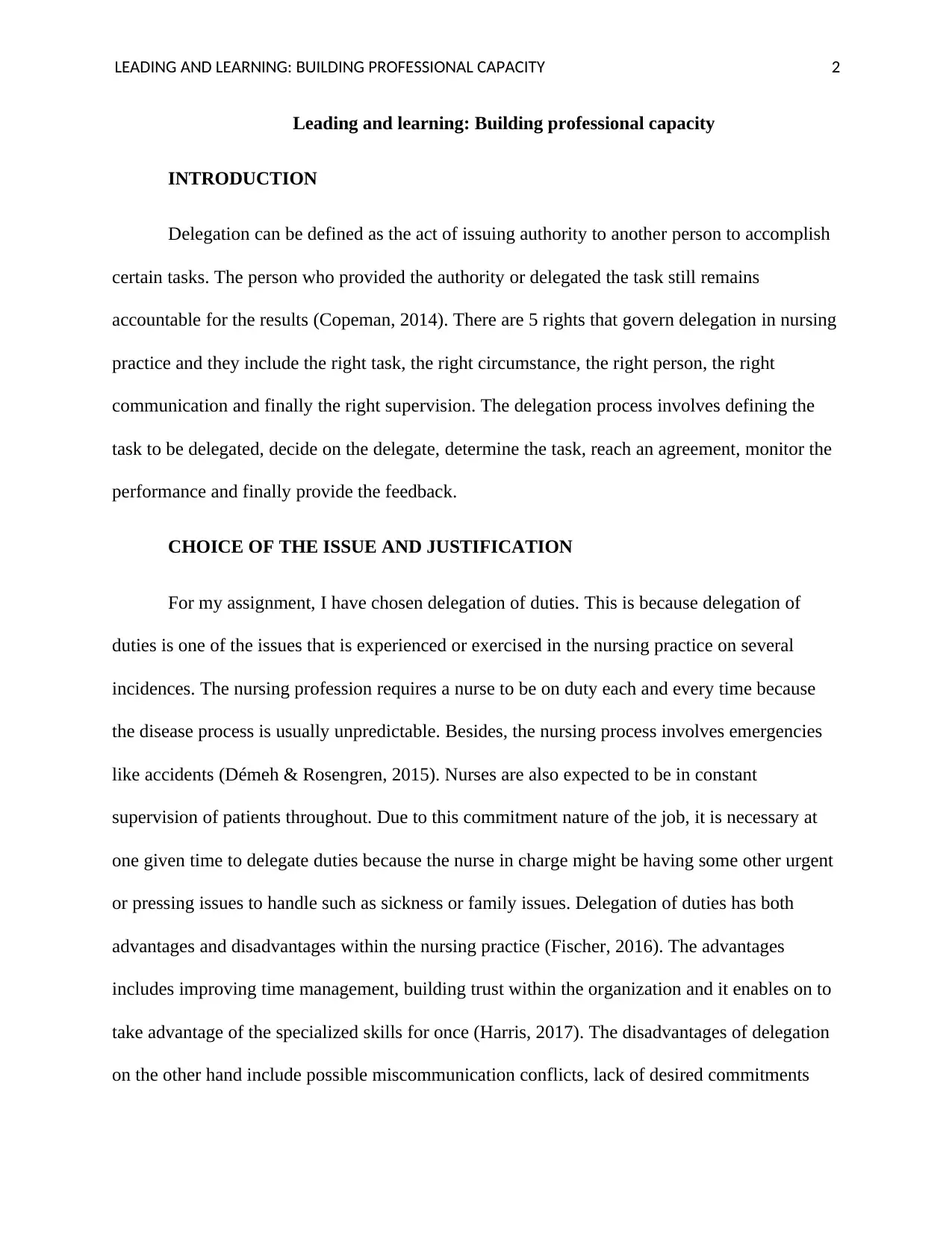
LEADING AND LEARNING: BUILDING PROFESSIONAL CAPACITY 2
Leading and learning: Building professional capacity
INTRODUCTION
Delegation can be defined as the act of issuing authority to another person to accomplish
certain tasks. The person who provided the authority or delegated the task still remains
accountable for the results (Copeman, 2014). There are 5 rights that govern delegation in nursing
practice and they include the right task, the right circumstance, the right person, the right
communication and finally the right supervision. The delegation process involves defining the
task to be delegated, decide on the delegate, determine the task, reach an agreement, monitor the
performance and finally provide the feedback.
CHOICE OF THE ISSUE AND JUSTIFICATION
For my assignment, I have chosen delegation of duties. This is because delegation of
duties is one of the issues that is experienced or exercised in the nursing practice on several
incidences. The nursing profession requires a nurse to be on duty each and every time because
the disease process is usually unpredictable. Besides, the nursing process involves emergencies
like accidents (Démeh & Rosengren, 2015). Nurses are also expected to be in constant
supervision of patients throughout. Due to this commitment nature of the job, it is necessary at
one given time to delegate duties because the nurse in charge might be having some other urgent
or pressing issues to handle such as sickness or family issues. Delegation of duties has both
advantages and disadvantages within the nursing practice (Fischer, 2016). The advantages
includes improving time management, building trust within the organization and it enables on to
take advantage of the specialized skills for once (Harris, 2017). The disadvantages of delegation
on the other hand include possible miscommunication conflicts, lack of desired commitments
Leading and learning: Building professional capacity
INTRODUCTION
Delegation can be defined as the act of issuing authority to another person to accomplish
certain tasks. The person who provided the authority or delegated the task still remains
accountable for the results (Copeman, 2014). There are 5 rights that govern delegation in nursing
practice and they include the right task, the right circumstance, the right person, the right
communication and finally the right supervision. The delegation process involves defining the
task to be delegated, decide on the delegate, determine the task, reach an agreement, monitor the
performance and finally provide the feedback.
CHOICE OF THE ISSUE AND JUSTIFICATION
For my assignment, I have chosen delegation of duties. This is because delegation of
duties is one of the issues that is experienced or exercised in the nursing practice on several
incidences. The nursing profession requires a nurse to be on duty each and every time because
the disease process is usually unpredictable. Besides, the nursing process involves emergencies
like accidents (Démeh & Rosengren, 2015). Nurses are also expected to be in constant
supervision of patients throughout. Due to this commitment nature of the job, it is necessary at
one given time to delegate duties because the nurse in charge might be having some other urgent
or pressing issues to handle such as sickness or family issues. Delegation of duties has both
advantages and disadvantages within the nursing practice (Fischer, 2016). The advantages
includes improving time management, building trust within the organization and it enables on to
take advantage of the specialized skills for once (Harris, 2017). The disadvantages of delegation
on the other hand include possible miscommunication conflicts, lack of desired commitments
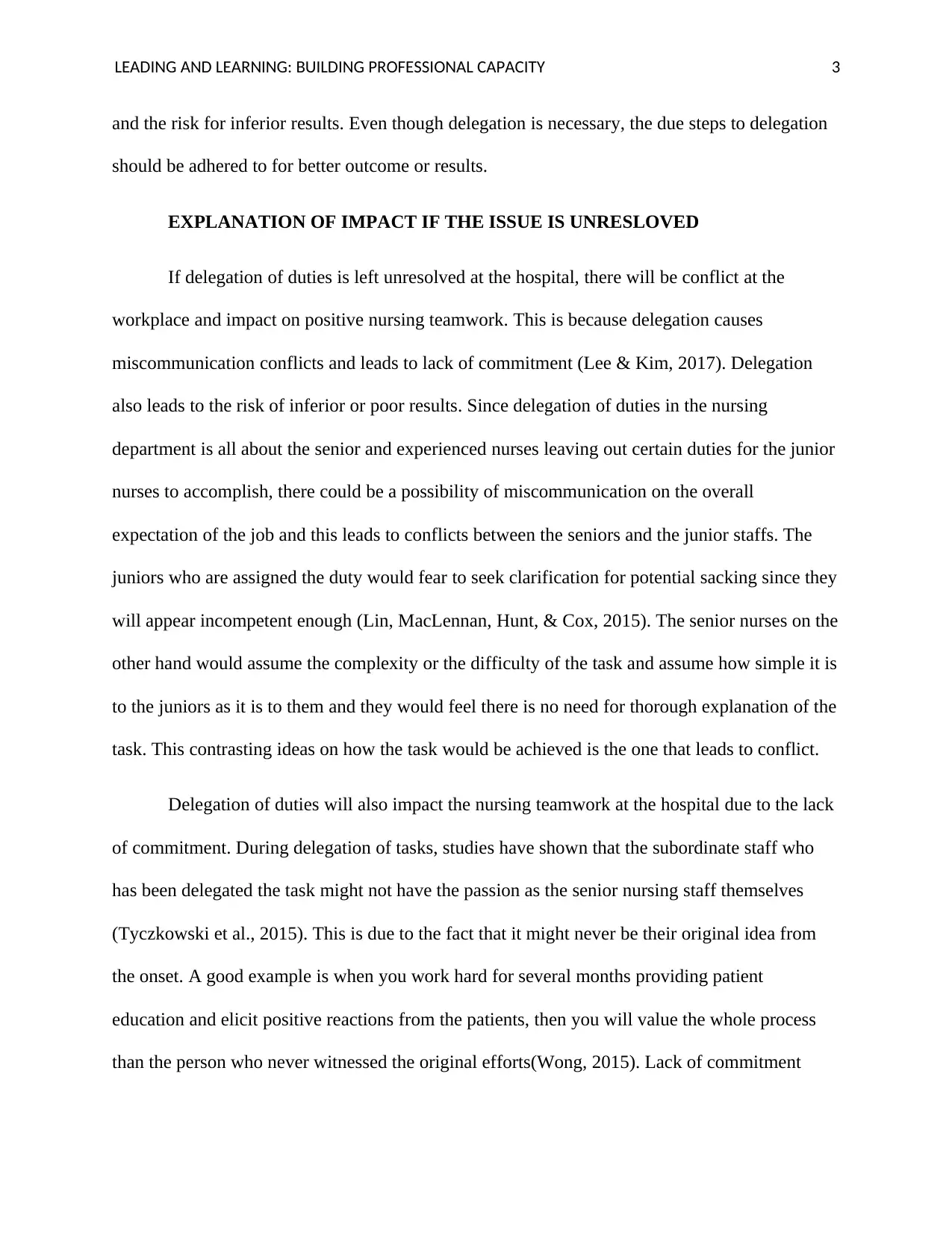
LEADING AND LEARNING: BUILDING PROFESSIONAL CAPACITY 3
and the risk for inferior results. Even though delegation is necessary, the due steps to delegation
should be adhered to for better outcome or results.
EXPLANATION OF IMPACT IF THE ISSUE IS UNRESLOVED
If delegation of duties is left unresolved at the hospital, there will be conflict at the
workplace and impact on positive nursing teamwork. This is because delegation causes
miscommunication conflicts and leads to lack of commitment (Lee & Kim, 2017). Delegation
also leads to the risk of inferior or poor results. Since delegation of duties in the nursing
department is all about the senior and experienced nurses leaving out certain duties for the junior
nurses to accomplish, there could be a possibility of miscommunication on the overall
expectation of the job and this leads to conflicts between the seniors and the junior staffs. The
juniors who are assigned the duty would fear to seek clarification for potential sacking since they
will appear incompetent enough (Lin, MacLennan, Hunt, & Cox, 2015). The senior nurses on the
other hand would assume the complexity or the difficulty of the task and assume how simple it is
to the juniors as it is to them and they would feel there is no need for thorough explanation of the
task. This contrasting ideas on how the task would be achieved is the one that leads to conflict.
Delegation of duties will also impact the nursing teamwork at the hospital due to the lack
of commitment. During delegation of tasks, studies have shown that the subordinate staff who
has been delegated the task might not have the passion as the senior nursing staff themselves
(Tyczkowski et al., 2015). This is due to the fact that it might never be their original idea from
the onset. A good example is when you work hard for several months providing patient
education and elicit positive reactions from the patients, then you will value the whole process
than the person who never witnessed the original efforts(Wong, 2015). Lack of commitment
and the risk for inferior results. Even though delegation is necessary, the due steps to delegation
should be adhered to for better outcome or results.
EXPLANATION OF IMPACT IF THE ISSUE IS UNRESLOVED
If delegation of duties is left unresolved at the hospital, there will be conflict at the
workplace and impact on positive nursing teamwork. This is because delegation causes
miscommunication conflicts and leads to lack of commitment (Lee & Kim, 2017). Delegation
also leads to the risk of inferior or poor results. Since delegation of duties in the nursing
department is all about the senior and experienced nurses leaving out certain duties for the junior
nurses to accomplish, there could be a possibility of miscommunication on the overall
expectation of the job and this leads to conflicts between the seniors and the junior staffs. The
juniors who are assigned the duty would fear to seek clarification for potential sacking since they
will appear incompetent enough (Lin, MacLennan, Hunt, & Cox, 2015). The senior nurses on the
other hand would assume the complexity or the difficulty of the task and assume how simple it is
to the juniors as it is to them and they would feel there is no need for thorough explanation of the
task. This contrasting ideas on how the task would be achieved is the one that leads to conflict.
Delegation of duties will also impact the nursing teamwork at the hospital due to the lack
of commitment. During delegation of tasks, studies have shown that the subordinate staff who
has been delegated the task might not have the passion as the senior nursing staff themselves
(Tyczkowski et al., 2015). This is due to the fact that it might never be their original idea from
the onset. A good example is when you work hard for several months providing patient
education and elicit positive reactions from the patients, then you will value the whole process
than the person who never witnessed the original efforts(Wong, 2015). Lack of commitment
⊘ This is a preview!⊘
Do you want full access?
Subscribe today to unlock all pages.

Trusted by 1+ million students worldwide
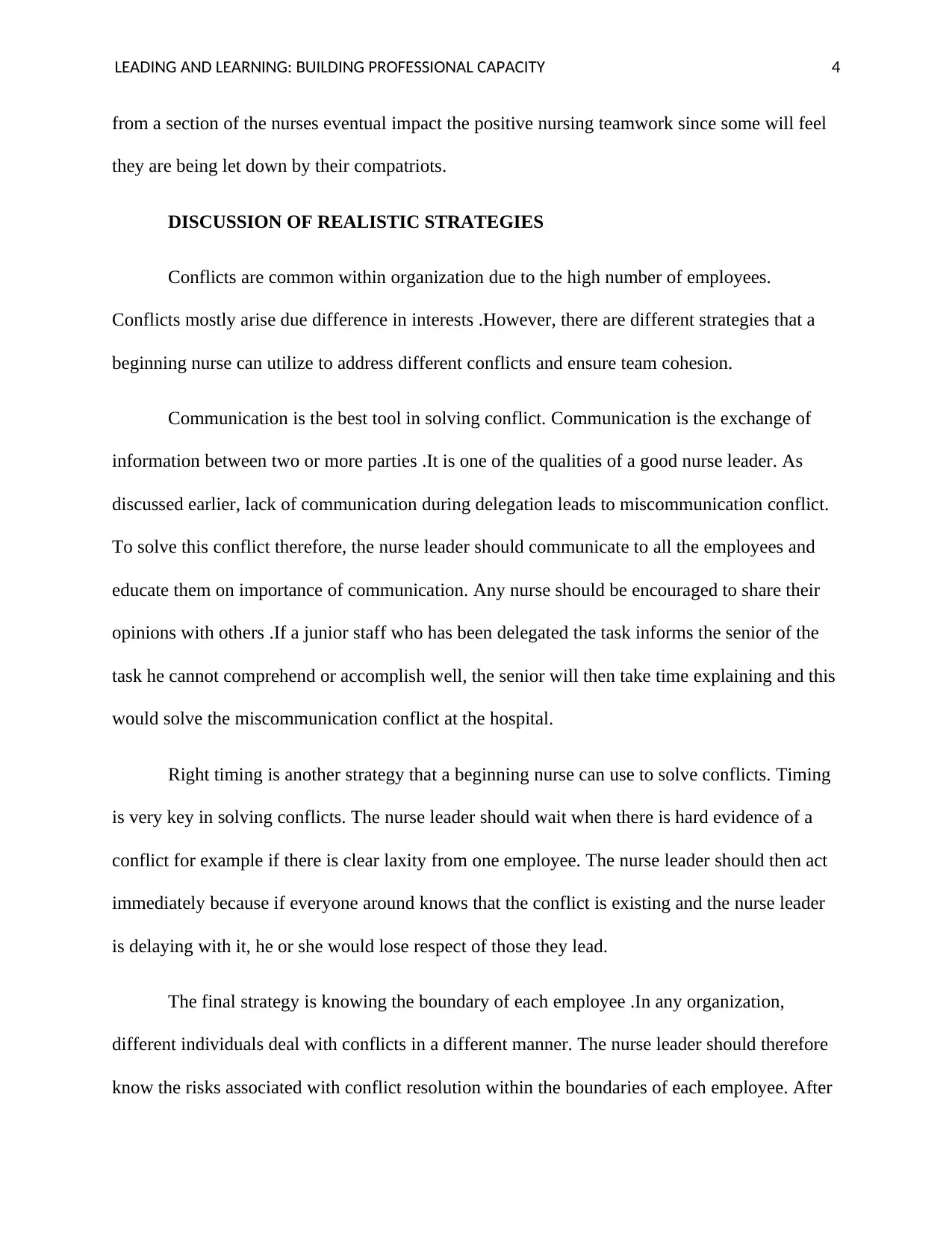
LEADING AND LEARNING: BUILDING PROFESSIONAL CAPACITY 4
from a section of the nurses eventual impact the positive nursing teamwork since some will feel
they are being let down by their compatriots.
DISCUSSION OF REALISTIC STRATEGIES
Conflicts are common within organization due to the high number of employees.
Conflicts mostly arise due difference in interests .However, there are different strategies that a
beginning nurse can utilize to address different conflicts and ensure team cohesion.
Communication is the best tool in solving conflict. Communication is the exchange of
information between two or more parties .It is one of the qualities of a good nurse leader. As
discussed earlier, lack of communication during delegation leads to miscommunication conflict.
To solve this conflict therefore, the nurse leader should communicate to all the employees and
educate them on importance of communication. Any nurse should be encouraged to share their
opinions with others .If a junior staff who has been delegated the task informs the senior of the
task he cannot comprehend or accomplish well, the senior will then take time explaining and this
would solve the miscommunication conflict at the hospital.
Right timing is another strategy that a beginning nurse can use to solve conflicts. Timing
is very key in solving conflicts. The nurse leader should wait when there is hard evidence of a
conflict for example if there is clear laxity from one employee. The nurse leader should then act
immediately because if everyone around knows that the conflict is existing and the nurse leader
is delaying with it, he or she would lose respect of those they lead.
The final strategy is knowing the boundary of each employee .In any organization,
different individuals deal with conflicts in a different manner. The nurse leader should therefore
know the risks associated with conflict resolution within the boundaries of each employee. After
from a section of the nurses eventual impact the positive nursing teamwork since some will feel
they are being let down by their compatriots.
DISCUSSION OF REALISTIC STRATEGIES
Conflicts are common within organization due to the high number of employees.
Conflicts mostly arise due difference in interests .However, there are different strategies that a
beginning nurse can utilize to address different conflicts and ensure team cohesion.
Communication is the best tool in solving conflict. Communication is the exchange of
information between two or more parties .It is one of the qualities of a good nurse leader. As
discussed earlier, lack of communication during delegation leads to miscommunication conflict.
To solve this conflict therefore, the nurse leader should communicate to all the employees and
educate them on importance of communication. Any nurse should be encouraged to share their
opinions with others .If a junior staff who has been delegated the task informs the senior of the
task he cannot comprehend or accomplish well, the senior will then take time explaining and this
would solve the miscommunication conflict at the hospital.
Right timing is another strategy that a beginning nurse can use to solve conflicts. Timing
is very key in solving conflicts. The nurse leader should wait when there is hard evidence of a
conflict for example if there is clear laxity from one employee. The nurse leader should then act
immediately because if everyone around knows that the conflict is existing and the nurse leader
is delaying with it, he or she would lose respect of those they lead.
The final strategy is knowing the boundary of each employee .In any organization,
different individuals deal with conflicts in a different manner. The nurse leader should therefore
know the risks associated with conflict resolution within the boundaries of each employee. After
Paraphrase This Document
Need a fresh take? Get an instant paraphrase of this document with our AI Paraphraser
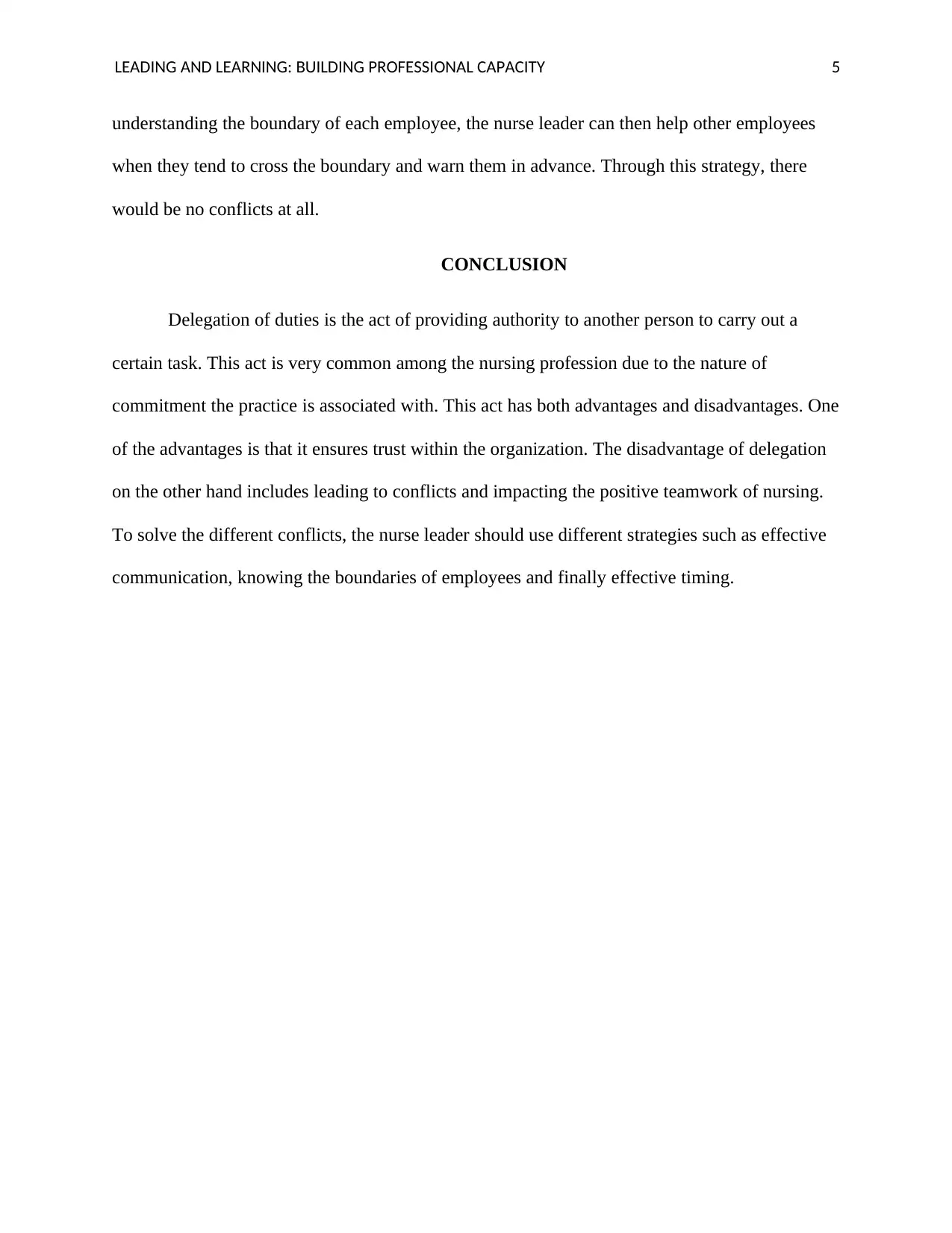
LEADING AND LEARNING: BUILDING PROFESSIONAL CAPACITY 5
understanding the boundary of each employee, the nurse leader can then help other employees
when they tend to cross the boundary and warn them in advance. Through this strategy, there
would be no conflicts at all.
CONCLUSION
Delegation of duties is the act of providing authority to another person to carry out a
certain task. This act is very common among the nursing profession due to the nature of
commitment the practice is associated with. This act has both advantages and disadvantages. One
of the advantages is that it ensures trust within the organization. The disadvantage of delegation
on the other hand includes leading to conflicts and impacting the positive teamwork of nursing.
To solve the different conflicts, the nurse leader should use different strategies such as effective
communication, knowing the boundaries of employees and finally effective timing.
understanding the boundary of each employee, the nurse leader can then help other employees
when they tend to cross the boundary and warn them in advance. Through this strategy, there
would be no conflicts at all.
CONCLUSION
Delegation of duties is the act of providing authority to another person to carry out a
certain task. This act is very common among the nursing profession due to the nature of
commitment the practice is associated with. This act has both advantages and disadvantages. One
of the advantages is that it ensures trust within the organization. The disadvantage of delegation
on the other hand includes leading to conflicts and impacting the positive teamwork of nursing.
To solve the different conflicts, the nurse leader should use different strategies such as effective
communication, knowing the boundaries of employees and finally effective timing.
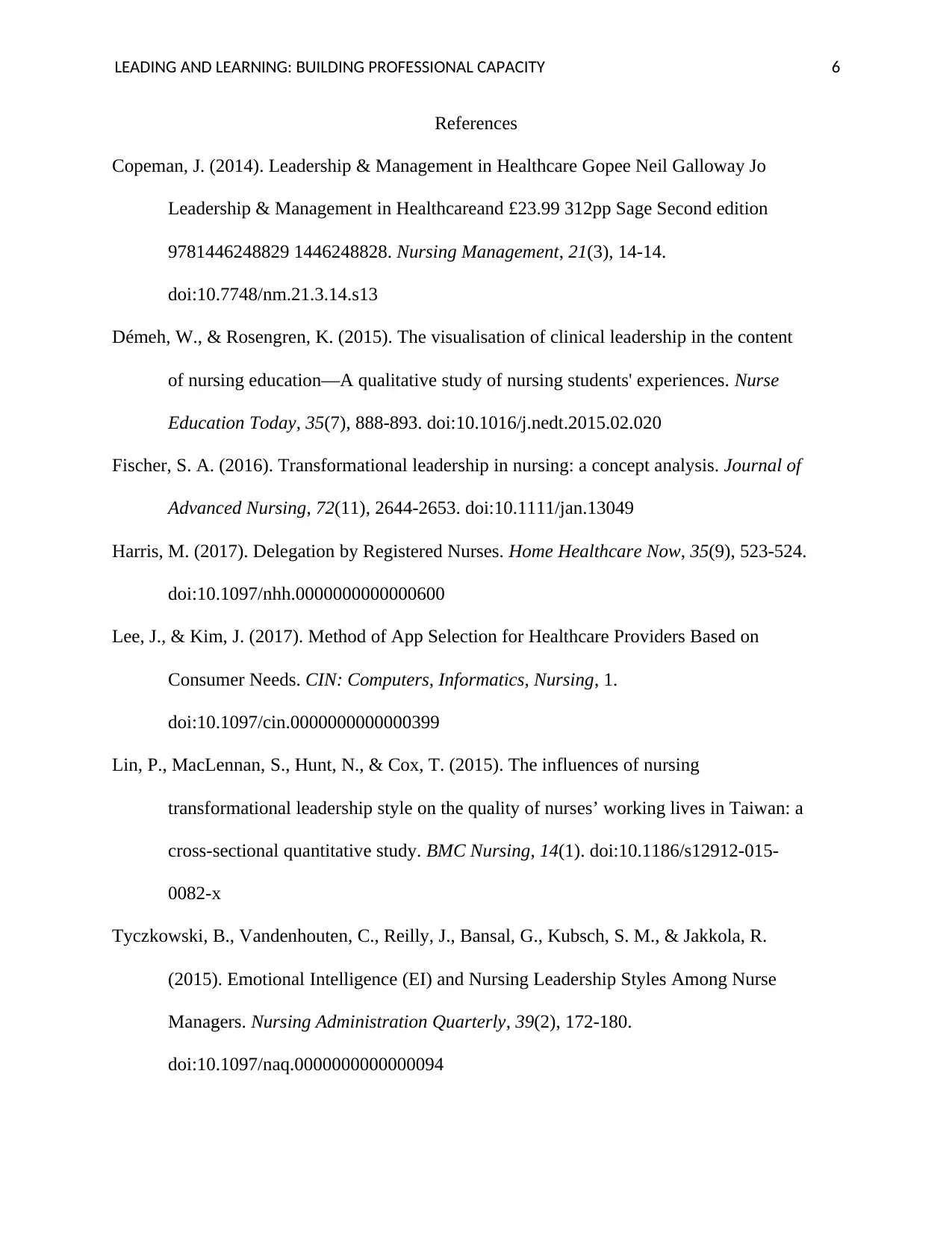
LEADING AND LEARNING: BUILDING PROFESSIONAL CAPACITY 6
References
Copeman, J. (2014). Leadership & Management in Healthcare Gopee Neil Galloway Jo
Leadership & Management in Healthcareand £23.99 312pp Sage Second edition
9781446248829 1446248828. Nursing Management, 21(3), 14-14.
doi:10.7748/nm.21.3.14.s13
Démeh, W., & Rosengren, K. (2015). The visualisation of clinical leadership in the content
of nursing education—A qualitative study of nursing students' experiences. Nurse
Education Today, 35(7), 888-893. doi:10.1016/j.nedt.2015.02.020
Fischer, S. A. (2016). Transformational leadership in nursing: a concept analysis. Journal of
Advanced Nursing, 72(11), 2644-2653. doi:10.1111/jan.13049
Harris, M. (2017). Delegation by Registered Nurses. Home Healthcare Now, 35(9), 523-524.
doi:10.1097/nhh.0000000000000600
Lee, J., & Kim, J. (2017). Method of App Selection for Healthcare Providers Based on
Consumer Needs. CIN: Computers, Informatics, Nursing, 1.
doi:10.1097/cin.0000000000000399
Lin, P., MacLennan, S., Hunt, N., & Cox, T. (2015). The influences of nursing
transformational leadership style on the quality of nurses’ working lives in Taiwan: a
cross-sectional quantitative study. BMC Nursing, 14(1). doi:10.1186/s12912-015-
0082-x
Tyczkowski, B., Vandenhouten, C., Reilly, J., Bansal, G., Kubsch, S. M., & Jakkola, R.
(2015). Emotional Intelligence (EI) and Nursing Leadership Styles Among Nurse
Managers. Nursing Administration Quarterly, 39(2), 172-180.
doi:10.1097/naq.0000000000000094
References
Copeman, J. (2014). Leadership & Management in Healthcare Gopee Neil Galloway Jo
Leadership & Management in Healthcareand £23.99 312pp Sage Second edition
9781446248829 1446248828. Nursing Management, 21(3), 14-14.
doi:10.7748/nm.21.3.14.s13
Démeh, W., & Rosengren, K. (2015). The visualisation of clinical leadership in the content
of nursing education—A qualitative study of nursing students' experiences. Nurse
Education Today, 35(7), 888-893. doi:10.1016/j.nedt.2015.02.020
Fischer, S. A. (2016). Transformational leadership in nursing: a concept analysis. Journal of
Advanced Nursing, 72(11), 2644-2653. doi:10.1111/jan.13049
Harris, M. (2017). Delegation by Registered Nurses. Home Healthcare Now, 35(9), 523-524.
doi:10.1097/nhh.0000000000000600
Lee, J., & Kim, J. (2017). Method of App Selection for Healthcare Providers Based on
Consumer Needs. CIN: Computers, Informatics, Nursing, 1.
doi:10.1097/cin.0000000000000399
Lin, P., MacLennan, S., Hunt, N., & Cox, T. (2015). The influences of nursing
transformational leadership style on the quality of nurses’ working lives in Taiwan: a
cross-sectional quantitative study. BMC Nursing, 14(1). doi:10.1186/s12912-015-
0082-x
Tyczkowski, B., Vandenhouten, C., Reilly, J., Bansal, G., Kubsch, S. M., & Jakkola, R.
(2015). Emotional Intelligence (EI) and Nursing Leadership Styles Among Nurse
Managers. Nursing Administration Quarterly, 39(2), 172-180.
doi:10.1097/naq.0000000000000094
⊘ This is a preview!⊘
Do you want full access?
Subscribe today to unlock all pages.

Trusted by 1+ million students worldwide
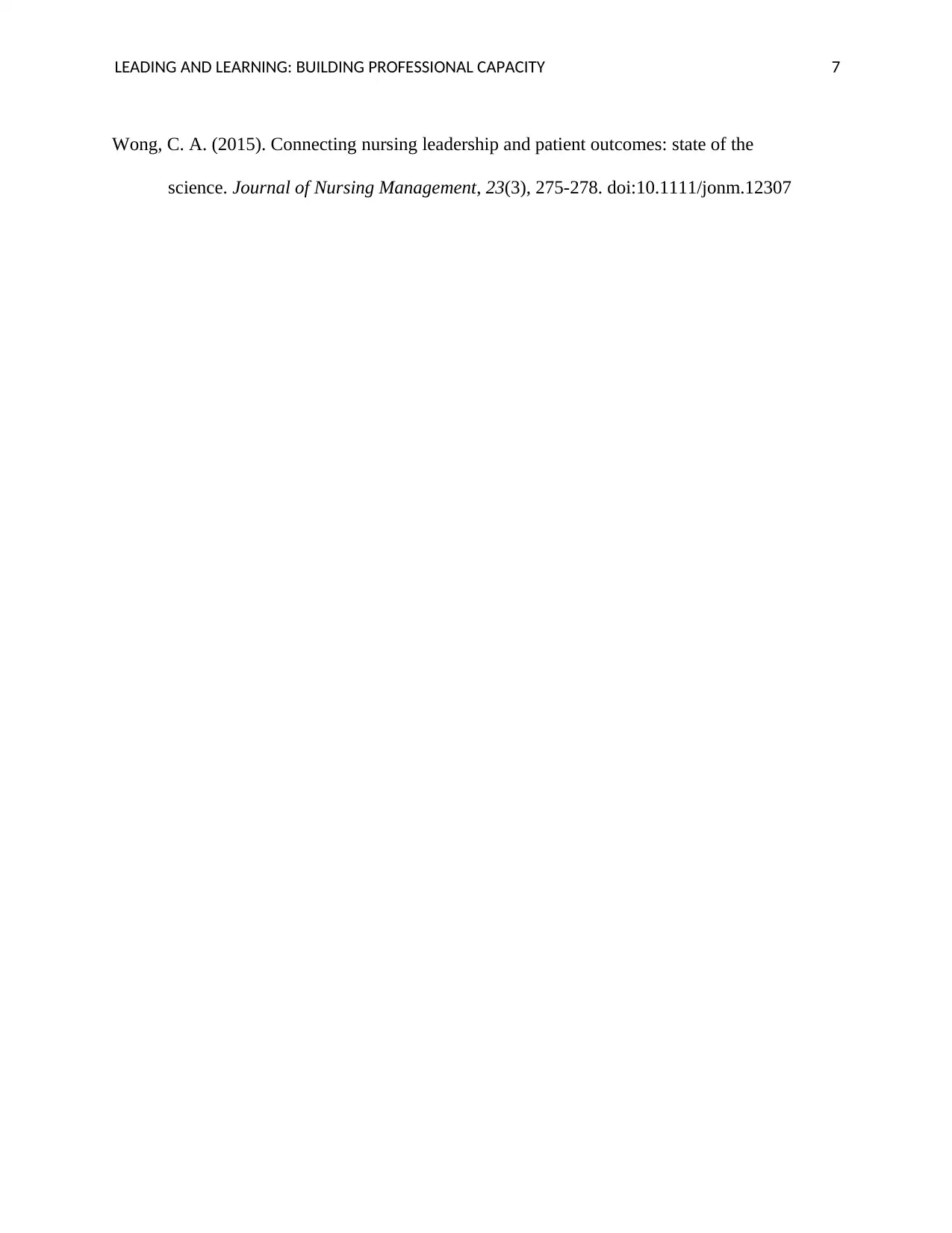
LEADING AND LEARNING: BUILDING PROFESSIONAL CAPACITY 7
Wong, C. A. (2015). Connecting nursing leadership and patient outcomes: state of the
science. Journal of Nursing Management, 23(3), 275-278. doi:10.1111/jonm.12307
Wong, C. A. (2015). Connecting nursing leadership and patient outcomes: state of the
science. Journal of Nursing Management, 23(3), 275-278. doi:10.1111/jonm.12307
1 out of 7
Related Documents
Your All-in-One AI-Powered Toolkit for Academic Success.
+13062052269
info@desklib.com
Available 24*7 on WhatsApp / Email
![[object Object]](/_next/static/media/star-bottom.7253800d.svg)
Unlock your academic potential
Copyright © 2020–2026 A2Z Services. All Rights Reserved. Developed and managed by ZUCOL.




